On 18 April 2024, family history enthusiasts and records custodians met at a FamilySearch symposium in Brisbane, Australia.
Presentations and discussions centered on new ways to connect families and communities through the generations.
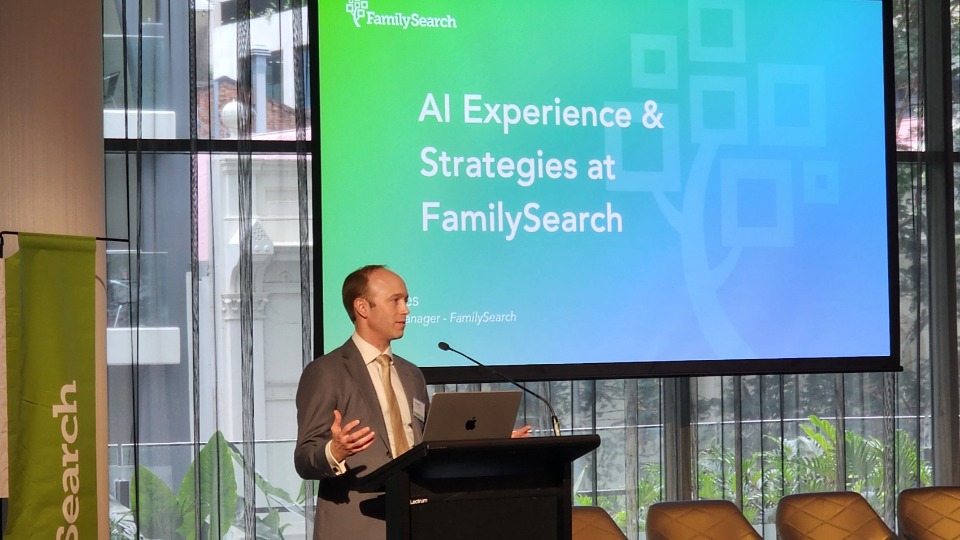
Brisbane-FS
Ian James, technical product manager at FamilySearch International, speaks at an event in Brisbane, Australia, on 18 April 2024.© 2024 by Intellectual Reserve, Inc. All rights reserved.Paul Bennallack, the Australian Representative of FamilySearch International, was MC for the symposium and the dinner which followed. He welcomed guests and introduced speakers, beginning with Stephen Rockwood, CEO of FamilySearch International.
“We love the idea of connecting ourselves to our homelands,” Rockwood said.
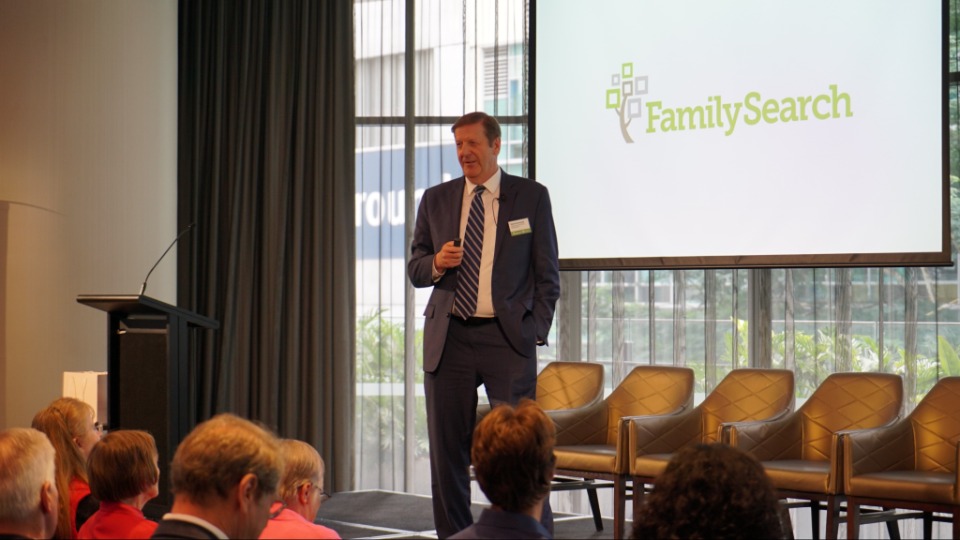
DSC04867.JPG
Stephen Rockwood, CEO of FamilySearch International, speaks at a family history event in Brisbane, Australia on 18 April 2024.© 2024 by Intellectual Reserve, Inc. All rights reserved.“Every person deserves to be remembered. FamilySearch helps you discover, gather and connect your ancestors. There are 30 family history centres here in Brisbane. We simply want to help you discover your family.”
He added, “Once a year, we gather for RootsTech. This year, we had 4.5 million people join. We have 5,000 family history libraries available worldwide. One on one help is available to all.”
Denver Beanland, Chairman of the Advisory Council of the Australian National Archive, said, “Records belong to the people. Organisations like FamilySearch perform a great service getting public documents into a digital format.”
Josephine Secis, Assistant Director-General of the National Archives of Australia, spoke about how the organisation is connecting the past to the future.
She also announced that National Archives had just signed an agreement with FamilySearch to share technologies and digitise immigration records.
“The agreement will increase accessibility to Australians. We can work together in a collaborative way,” she said.
Michael Colemere, Homeland Director of FamilySearch International, facilitated a panel discussion.
New Zealand-born Wayne Metcalfe, FamilySearch International’s Asia-Pacific Manager, recalled how much technology has changed in the last 130 years.
“When FamilySearch started in 1894, a handful of books were available in the Family History Library in Salt Lake City. Then, microfilm became available. Now digitalisation can be done in our own homes.”
David Fricker, Strategic Advisor for the National Library and Archives UAE, said, “Rather than thinking of it as a family history industry, it’s more a movement of cultural expression. This is not a competitive industry. We’re trying to contribute to the knowledge of who we are as a community family, in society and humanity.”
“The biggest problem we have is scale,” he said. “AI will accelerate the work of the archivist. The end of the chain is when someone’s life is changed because technology touches everything we do.”
Speaking to the challenge of engaging more young people, Fricker said, “We need to go to where the young people are, wherever that might be. Talk to them and find out what they want and need. There’s an opportunity around technology that will resonate with young people.”
Speaking to the librarians, archivists and other records custodians present, Stephen Rockwood said, “This isn’t about FamilySearch. It’s about you. If it wasn’t for the archivist, camera operator, computer operator, web developer, etc., we wouldn’t be able to tell our grandchildren stories of their ancestors. There’s a new urgency driving us to remember and to be remembered—to help [our grandchildren].”
At the conference dinner that evening, Elder Jeremy R. Jaggi of the Pacific Area Presidency of The Church of Jesus Christ of Latter-day Saints thanked guests for attending the event.
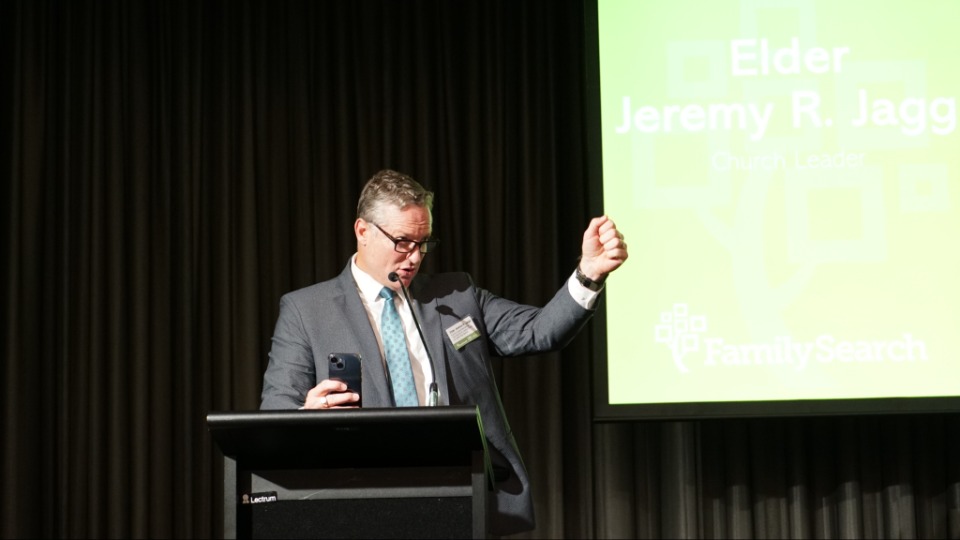
Brisbane-FS
Elder Jeremy R. Jaggi of the Pacific Area Presidency of The Church of Jesus Christ of Latter-day Saints speaks at a FamilySearch event in Brisbane, Australia, on 18 April 2024.© 2024 by Intellectual Reserve, Inc. All rights reserved.He invited everyone in the room to download the FamilySearch “Family Tree” app, and to do the “Relatives Near Me” activity.
Over the next few minutes there were happy comments across the room, such as, “We’re related!” And “You’re my 12th cousin!”
Elder Jaggi said that we are one human family, and that FamilySearch and other organisations are helping the world learn who we are and that we are all connected.
Hon Tony Abbott, former Prime Minister of Australia, said, “I’m honoured to be here to celebrate 130 years of FamilySearch. Parents are our first teachers; siblings are our first friends. Nations are made by their past. If we as Australians were more familiar with our history, we’d make better choices today.”
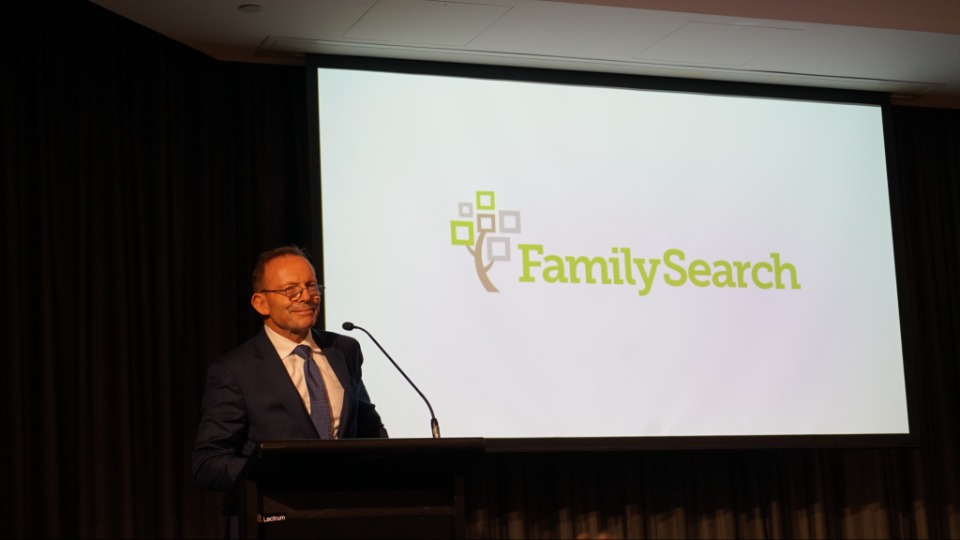
Brisbane-FS
Former Prime Minister of Australia, Hon Tony Abbott, speaks at a FamilySearch event in Brisbane Australia, on 18 April 2024.© 2024 by Intellectual Reserve, Inc. All rights reserved.He spoke of being presented with a copy of several generations of his family history by Elder Quentin L. Cook of the Quorum of the Twelve Apostles of The Church of Jesus Christ of Latter-day Saints in 2015. He said that it helped him and his family to learn some new facts about their family history.
Kevin Hamilton, CEO of FamilySearch International, said, “FamilySearch is wholly owned by The Church of Jesus Christ of Latter-day Saints. Ninety percent of its users are not members of our church. We’re a non-profit, non-revenue organisation, yet we have quite an appetite to be involved in this business. The question is always, ‘Why do you do this?’”
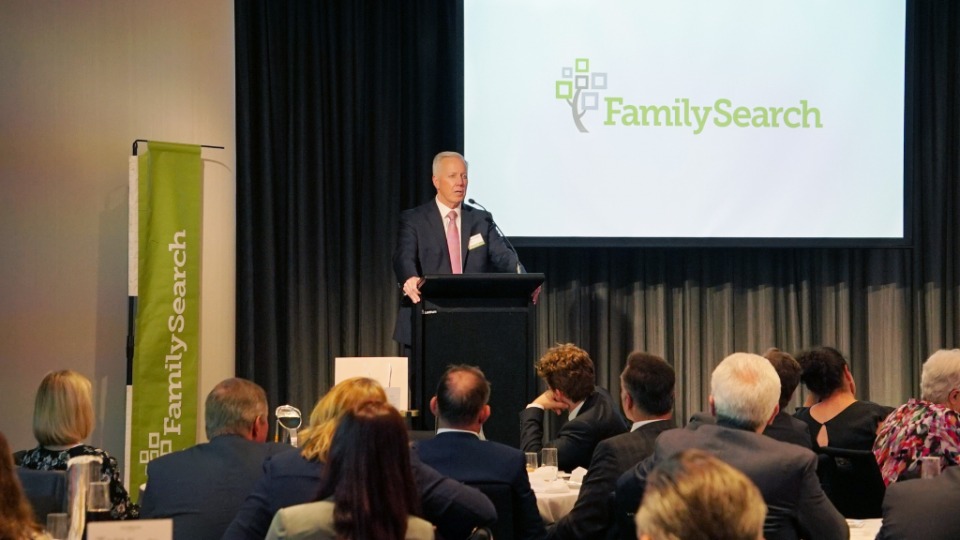
Brisbane-FS
Elder Kevin S. Hamilton, Chairman of FamilySearch International, shares the purpose of FamilySearch in concluding remarks at Brisbane symposium on 18 April 2024.© 2024 by Intellectual Reserve, Inc. All rights reserved.“The answer is our theology, our doctrine. We believe in God the Father and that we are His children. If we can identify our families and perform their ordinances, we can be with them for eternity.”
He continued, “We think it will be done one individual, one family at a time, in a collaborative fashion with everyone working in harmony together. “
“We’ve never seen division and polarisation as we see it now. As we identify our ancestors, we identify our common connections. When we see how we are connected, we behave differently. We embrace diversity. We need more civility and more kindness.
“Family connections can do that.”
Brisbane couple, Carl and Karen Maurer attended the event. “Connections create opportunities,” Carl Maurer said.
Karen Maurer added, “We’re excited to know that the Church has provided something for the Australian people, particularly in the archival space. This is a safe space to find commonality.
According to Paul Bennallack, “The conference had a unifying effect with the archivists. FamilySearch is here to help them reach their goals.”
- Nattress.png
- Brisbane-FS
- Brisbane-FS
- Brisbane-FS
- Brisbane-FS
- Brisbane-FS
- Brisbane-FS
- Brisbane-FS
- Brisbane-FS
| Temple Square is always beautiful in the springtime. Gardeners work to prepare the ground for General Conference. © 2012 Intellectual Reserve, Inc. All rights reserved. | 1 / 2 |